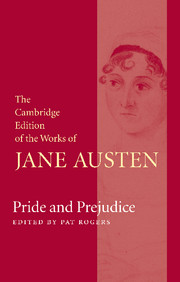Book contents
- Frontmatter
- Contents
- General Editor’s Preface
- Acknowledgements
- Chronology
- Introduction
- Note on the Text
- Pride and Prejudice
- Pride and Prejudice: Volume I
- Pride and Prejudice: Volume II
- Pride and Prejudice: Volume III
- Corrections and Emendations to 1813 text
- Appendix 1 Thomas Egerton and the Publication History
- Appendix 2 Legal and Military Background
- Appendix 3 Pemberley and its Models
- Appendix 4 Note on the second and third editions of Pride and Prejudice
- Abbreviations
- Explanatory Notes
Chapter 9
Published online by Cambridge University Press: 19 December 2020
- Frontmatter
- Contents
- General Editor’s Preface
- Acknowledgements
- Chronology
- Introduction
- Note on the Text
- Pride and Prejudice
- Pride and Prejudice: Volume I
- Pride and Prejudice: Volume II
- Pride and Prejudice: Volume III
- Corrections and Emendations to 1813 text
- Appendix 1 Thomas Egerton and the Publication History
- Appendix 2 Legal and Military Background
- Appendix 3 Pemberley and its Models
- Appendix 4 Note on the second and third editions of Pride and Prejudice
- Abbreviations
- Explanatory Notes
Summary
ELIZABETH passed the chief of the night in her sister’s room, and in the morning had the pleasure of being able to send a tolerable answer to the enquiries which she very early received from Mr. Bingley by a housemaid, and some time afterwards from the two elegant ladies who waited on his sisters. In spite of this amendment, however, she requested to have a note sent to Longbourn, desiring her mother to visit Jane, and form her own judgment of her situation. The note was immediately dispatched, and its contents as quickly complied with. Mrs. Bennet, accompanied by her two youngest girls, reached Netherfield soon after the family breakfast.
Had she found Jane in any apparent danger, Mrs. Bennet would have been very miserable; but being satisfied on seeing her that her illness was not alarming, she had no wish of her recovering immediately, as her restoration to health would probably remove her from Netherfield. She would not listen therefore to her daughter's proposal of being carried home; neither did the apothecary, who arrived about the same time, think it at all advisable. After sitting a little while with Jane, on Miss Bingley's appearance and invitation, the mother and three daughters all attended her into the breakfast parlour. Bingley met them with hopes that Mrs. Bennet had not found Miss Bennet worse than she expected.
“Indeed I have, Sir,” was her answer. “She is a great deal too ill to be moved. Mr. Jones says we must not think of moving her. We must trespass a little longer on your kindness.”
“Removed!” cried Bingley. “It must not be thought of. My sister, I am sure, will not hear of her removal.”
“You may depend upon it, Madam,” said Miss Bingley, with cold civility, “that Miss Bennet shall receive every possible attention while she remains with us.”
Mrs. Bennet was profuse in her acknowledgments.
“I am sure,” she added, “if it was not for such good friends I do not know what would become of her, for she is very ill indeed, and suffers a vast deal, though with the greatest patience in the world, which is always the way with her, for she has, without exception, the sweetest temper I ever met with. I often tell my other girls they are nothing to her.
- Type
- Chapter
- Information
- Pride and Prejudice , pp. 45 - 50Publisher: Cambridge University PressPrint publication year: 2006

